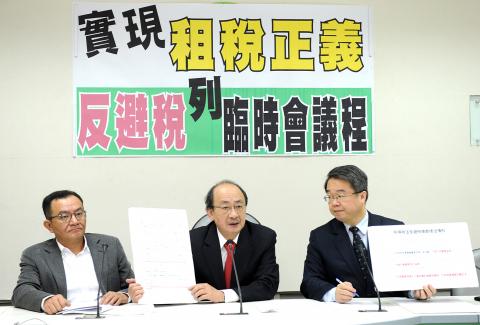The Democratic Progressive Party (DPP) caucus said yesterday that a proposed amendment to the Income Tax Act (所得稅法) would be the party’s main focus in the extra session that begins tomorrow, saying that it is the most important bill to address the issue of “tax justice” in the wake of the revelation of Taiwanese businesspeople’s exploitation of tax havens to avoid paying taxes.
“[The DPP] is proposing this to highlight our call for tax justice and as another test for the Chinese Nationalist Party’s [KMT] core values,” DPP caucus convener Ker Chien-ming (柯建銘) told a press conference.
The press conference was held before the legislative agenda is to be decided in an informal meeting today, in which lawmakers are to discuss the bill proposals to be listed on the agenda of the two-day extra session.

Photo: Lo Pei-der, Taipei Times
A two-year investigation project, conducted by the International Consortium of Investigative Journalists (ICIJ), found that more than 16,000 Taiwanese used “paper companies” in tax havens, such as the British Virgin Islands, to evade taxes.
The Chinese-language CommonWealth Magazine, a partner outlet of the consortium, estimated that up to NT$280 billion (US$9.23 billion) was kept abroad over the past 10 years to avoid taxes.
The DPP planned to propose amending Article 43 of the Income Tax Act to stop corporates from using overseas subsidiaries and paper companies to avoid taxation, Ker said.
The government’s failure to reform tax regulations produced a strange tax revenue structure, in which salaried workers contributed 75 percent of the total tax revenues, Ker said, adding that the tax rate of 12.8 percent in Taiwan ranked seventh lowest in the world and the lowest among Asian countries.
“Taiwan’s tax regulations have always favored the rich and large corporates. It is time to change that. We hope the KMT will not stand in the way,” Ker said.
The proposed amendment was going to the plenary session during the last legislative session in April last year until it was pulled from the agenda by the KMT a month later, DPP Legislator Wu Ping-jui (吳秉叡) said.
The DPP argued that amending the tax code would bring about better results to address fairness and justice, DPP Legislator Gao Jyh-peng (高志鵬) said.
The KMT has said that the amendment could lead to an exodus of more Taiwanese businesses and hurt foreign investment, but Gao dismissed those concerns saying that stricter tax regulations have been a global trend and those businesses trying to evade taxes should not be welcome in Taiwan.
Responding to the DPP’s initiative, KMT caucus secretary-general Lin Te-fu (林德福) said yesterday that the party did not oppose amending the law, but it did not welcome sloppy legislation and would prefer to deliberate the bill in the next legislative session.

Nipah virus infection is to be officially listed as a category 5 notifiable infectious disease in Taiwan in March, while clinical treatment guidelines are being formulated, the Centers for Disease Control (CDC) said yesterday. With Nipah infections being reported in other countries and considering its relatively high fatality rate, the centers on Jan. 16 announced that it would be listed as a notifiable infectious disease to bolster the nation’s systematic early warning system and increase public awareness, the CDC said. Bangladesh reported four fatal cases last year in separate districts, with three linked to raw date palm sap consumption, CDC Epidemic Intelligence

Two Taiwanese prosecutors were questioned by Chinese security personnel at their hotel during a trip to China’s Henan Province this month, the Mainland Affairs Council (MAC) said yesterday. The officers had personal information on the prosecutors, including “when they were assigned to their posts, their work locations and job titles,” MAC Deputy Minister and spokesman Liang Wen-chieh (梁文傑) said. On top of asking about their agencies and positions, the officers also questioned the prosecutors about the Cross-Strait Joint Crime-Fighting and Judicial Mutual Assistance Agreement, a pact that serves as the framework for Taiwan-China cooperation on combating crime and providing judicial assistance, Liang

Reports of Taiwanese going missing, being detained or interrogated, or having their personal liberties restricted in China increased about fourfold annually last year, the Mainland Affairs Council (MAC) said yesterday. Last year, 221 Taiwanese who traveled to China were reported missing, were detained and interrogated, or otherwise had their personal freedom restricted, up from 55 the previous year, the council said. Reopening group tours to China would be risky, as it would leave travelers with no way to seek help through official channels after Beijing shut down dialogue between the associations tasked with handling cross-strait tourism, the MAC said. Taipei’s Taiwan Strait Tourism

SHIFT: Taiwan is evolving from a transit stop into a tourist destination, with more international travelers willing to spend on tours, dining and cultural activities Taiwan rose three places in the World Tourism Barometer to 36th globally in 2024, with international tourism revenue of US$10.028 billion, the Tourism Administration said on Monday. The UN Tourism Organization publication said that its focus has switched from whether a country has returned to pre-COVID-19 levels of tourism to the amount spent by a tourist during an overseas trip. The nation last year welcomed 8.57 million international tourists, about 9 percent more than in 2024, with most tourists coming from Japan, South Korea, and Hong Kong and Macau, all of which accounted for at least 1 million tourists each. During the first